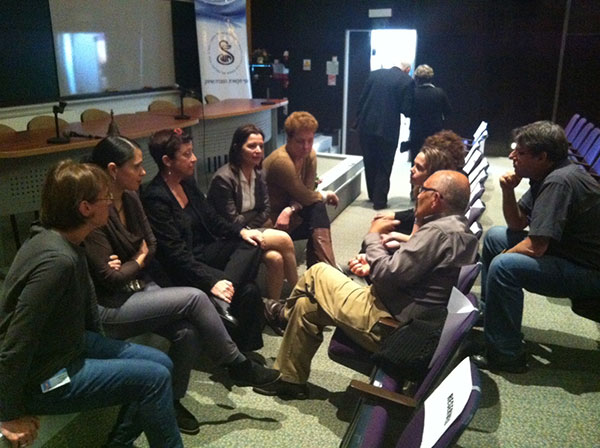 The participants, among others, included:
The participants, among others, included:
Prof. Joel Zlotogora, MD, PhD, Department of Community Genetics. Ministry of Health
Prof. Annick Raas-Rotschild, MD, National Coordinator for Orphanet Israel, The Danek Gertner Institute of Human Genetics, The Chaim Sheba Medical Center, Tel Hashomer, Israel
Prof. Karen Avraham, PhD., Department of Human Molecular Genetics and Biochemistry and Vice Dean, Sackler Faculty of Medicine, Tel Aviv University, Tel Aviv, Israel.
Prof. Stavit Shalev, MD, Director, Ha’emek Genetic Institute, Ha’emek Medical Center, Afula, Israel, the Rappaport faculty of Medicine, Technion, Haifa, Israel.
Prof. Lina Basel, MD, PhD, Director, Pediatric Genetics Unit, Schneider Children's Medical Center of Israel; The Raphael Recanati Genetic Institute, Rabin Medical Center, Beilinson Hospital, Petah Tikva, Israel; Felsenstein Medical Research Center, Rabin Medical Center, Petah Tikva Israel; Sackler Faculty of Medicine, Tel Aviv University, Tel Aviv, Israel.
Prof. Elon Pras, MD, Director, The Danek Gertner Institute of Human Genetics, The Chaim Sheba Medical Center, Tel Hashomer, Israel.
Dr. Hanna Vinkler, MD, PhD, Medical Geneticist, Wolfson Medical Center,
Holon, Israel.
Dr. Michal Berkenstadt, PhD, Head of Genetic Counseling, The Danek Gertner Institute of Human Genetics, The Chaim Sheba Medical Center, Tel Hashomer, Israel; Sackler Faculty of Medicine, Tel Aviv University, Tel Aviv, Israel.
Gili Reznick-Levi, MSc, Ha’emek Genetic Institute, Ha’emek Medical Center, Afula, the Rappaport faculty of Medicine, Technion, Haifa, Israel.
During the Consultation, the following issues were discussed and presented to the stakeholders:
- The current status of education in genetic counseling in Israel
- The TAU genetic counseling M.Sc. program student profile document including recommended core competence in genetic counseling
- The results of the questionnaire sent to physicians, genetic counselors, students, patients and health care authorities. The main points raised by the stakeholders were as follows:
1) Genetic counselors should acquire extensive knowledge in biology, biochemistry, embryology, anatomy, and genetic syndromes; 2) they should be experienced in different advanced laboratory methods and be able to interpret the results of the testing; 3) they should be aware of new studies in the fields of basic and applied science; 4) they should be able to explain the complexities of genetic disease to patients with no scientific background in a way that will allow them to make informed decisions about their health.
The following conclusions were reached during the National Consultation:
1. A large number of genetic counselors is expected to be required in the coming years. Therefore, the number of future students at Tel Aviv University should be between 6 and 10 per cycle. Several hospitals in the central part of Israel will be able to train students during their clinical rotations. Due to the lack of hospitals for the clinical rotation of TAU students, the number of students in the program may remain at 6 at the initial stage.
2. The MSc program, to officially begin October 2015 (or October 2016, to avoid overlapping with the Hebrew University of Jerusalem and the Technion), will run for two years, with frontal lectures by physicians (medical geneticists), researchers and genetic counselors in year 1, and with lectures and clinical rotations in affiliated hospitals in year 2. A research thesis will be optional. New classes will be admitted every 2 years. The curriculum should reflect the growing needs of Israeli society including the use of modern genomic technologies and skill in interpreting the results.
3. During the M.Sc. course, rotation in laboratories is very important and should be included in the program.
4. After graduation, genetic counselors should play a more active role in the development of the education of society to meet the needs of patients with hereditary disorders.
5. Education about medical genetics for the public, medical and other health professionals will be very important in order to make the best use of genetic services.
Close cooperation with patient organizations can promote awareness on diagnostic and therapeutic advances in genetics.